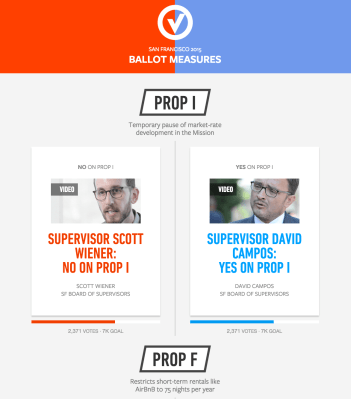Bobby Goodlatte’s childhood involved a non-stop political campaign — a whirlwind of pancake breakfasts, hand-shaking and kissing babies. That’s because his father, Bob Goodlatte, has served in U.S. Congress for nearly all of his life. That gave him years of exposure to how politics and governance actually works.
“I actually think that the mechanics of running for office have very little to do with how qualified or good a potential leader can be,” Goodlatte said. “We optimize for people who can campaign well — not people who can govern well.”
When Goodlatte grew up, he didn’t end up touching politics; his career took him in a totally different direction. He would later go on to work at Facebook as a designer. “I’ve been cagey about it for a very long time,” he said. “I’ve been very wary about having my dad open doors for me in life. We’re starting from the exact opposite sides of the political spectrum.”
But after several years of working at Facebook, he’s returning to some of the problems he was so exposed to as a child with a new project called OpenVote. It’s a platform for pledging votes and learning about political issues.
On it, you can pledge to vote a certain way, and spread your vote out to friends with arguments for your position.
“Broadly speaking, every time the media changes, politics also changes,” he said. “If you go back to the Nixon versus Kennedy debates, Nixon was sweating and he lost. That was the introduction of the TV era and the idea of owning the media cycle. Then after that came the Internet era, in which Obama did an amazing job. But there’s also this post-Facebook and post-social Internet era and I don’t know if we’ve seen a campaign that is run natively in this medium.”
The key difference now is that every voter has their own audience. So instead of needing campaigns that blast out messages in a one-to-many format, Goodlatte argues that there’s a possibility to let a campaign’s biggest advocates bundle up votes.
Goodlatte is actually optimistic about political media, in part because the Internet allows more sophisticated and in-depth debates than the soundbite cycle of 24-hour Cable news.
“I see more and more precise political arguments being communicated every day. John Oliver is #1 on that list for me. He’s articulating very in-depth and specific political concerns directly to his audience.”
He also pointed to some of the essays being spread around about Proposition F, which would more tightly regulated short-term rentals and Airbnb in SF. A couple of pieces went viral, including Eventbrite director Eric Meyerson’s worries about legal liability*, and housing activist Sara Shortt’s piece on loss of rent-controlled units to Airbnb.
As a beta test, Goodlatte is focusing the first version of OpenVote on San Francisco’s November elections, which have five housing-related ballot initiatives. The last day to register to vote is on October 19.
He and his co-founder Sean McCann have been going around San Francisco filming opposing arguments for different propositions.
Here are two arguments for and against Proposition I, which would put in a 18-month moratorium or pause on market-rate housing development in the Mission District. Supporters like non-profit MEDA and supervisor David Campos are hoping that this gives the neighborhood time to acquire the largest re-developable parcels of land in the neighborhood to put toward subsidized, affordable housing. Opponents are worried that this would drive up rents and eviction pressures even higher as ten to twenty thousand people a year keep moving to San Francisco anyway. They also add that the city can’t force or compel landowners to sell parcels to them.
David Campos, speaking for Proposition I from Openvote on Vimeo.
Scott Wiener, speaking against Proposition I from Openvote on Vimeo.
*Meyerson is writing about Prop. F as an individual, not as a representative of Eventbrite.
